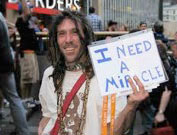By David Dodd
I distinctly remember, when we heard that the Grateful Dead would be the musical guests on Saturday Night Live, back in 1978, discussing with my roommates what we could expect in the way of song selection for the show. Would they do a selection of “greatest hits” (“Truckin’,” “Uncle John’s Band…”) or would they go for surprises? I predicted they would play their latest attempt at a top-40-friendly song, “I Need a Miracle,” from the just-released “Shakedown Street” LP. And yes, they did play a greatest hit—“Casey Jones,” but they also played “I Need a Miracle.”
Seemed like a future “greatest hit” to me! It had a big, catchy hook, and a memorable refrain. It had hyperbole. It was rock and roll.
That album, “Shakedown Street,” produced a few tunes with staying power in the ongoing live repertoire, most notably, of course, the title track, which turned into something really special. But the over-the-top lyrics of “I Need a Miracle,” along with what became a link to an ongoing tradition, has its own long-term appeal. And it, too, stayed in permanent rotation through the duration of their career, with the longest hiatus in performance being a 43-show gap from late summer 1982 to early summer 1983, for a total of 271 performances.
So: here’s the plan—each week, I will blog about a different song, focusing, usually, on the lyrics, but also on some other aspects of the song, including its overall impact—a truly subjective thing. Therefore, the best part, I would hope, would not be anything in particular that I might have to say, but rather, the conversation that may happen via the comments over the course of time. With Grateful Dead lyrics, there’s always a new and different take on what they bring up for each listener, it seems.
When I built the Annotated Grateful Dead Lyrics website, I actually did not even bother to annotate “I Need a Miracle.” It doesn’t have much in the way of the kind of literary or historical references that are the bread and butter of annotations. Really, the lyrics seem to me to be something Barlow might have written to one-up the image of women in other Dead songs, notably in “Sugar Magnolia.” Or it may have been an attempt to get away with the kind of sexism that doomed “Money Money” from the get-go.
“Miracle” seems light-hearted and self-aware—the character singing the song (and I do think it’s a character singing, not the persona of Weir, or of Barlow…) seems to be making fun of himself. “I need a woman ’bout twice my weight…a ton of fun who packs a gun with all her other freight.” I mean—what? And “It takes dynamite to get me up….too much of everything is just enough.” A nice turn of phrase. The miraculous is synonymous with the excessive, the transcendent with the hyperbolic and overblown.

“I Need a Miracle” signs by Deadheads.
But, despite the sense of the lyrics on the face of it, what “Miracle” did was to put something into Grateful Dead culture, just by way of introducing the word: miracle. I wonder who the first Deadhead was who thought of making a sign saying “I need a miracle,” and putting a finger in the air outside a show, asking for a ticket. But it soon became commonplace, and “miracle” became code for a last-minute, sometimes free ticket. I had the pleasure of giving out a miracle ticket a few times, and I have also received them, and it does feel miraculous, from both ends—giving and receiving.
Beyond that, though, and bigger, is how the word “miracle,” in common use, gave us a way of thinking (and sometimes talking) about what went on onstage. Being open to something miraculous occurring in performance had always been a part of the Dead’s playing. The X Factor, as it was sometimes called, was present when the music was playing the band. The idea of “needing a miracle every day” seems at first borderline ridiculous, but over time, maybe it seems less so, and even something to be expected. Certainly, from my own experience, the Dead delivered a miracle more often than not. And I became more open to finding the miraculous in daily life.




